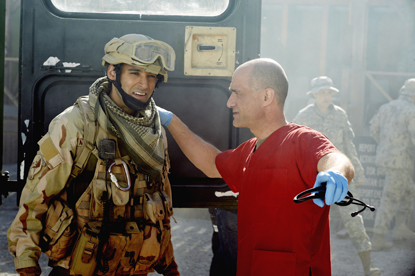 Nearly every war in history has been fictionalized in the popular media of its day. Fictional stories about combat explore areas that can be harder to capture with history and journalism. At their best, they illuminate the damage and sacrifice of war; at their worst, they create myths or outright fabrications that become some disjointed versions of the real thing.
Nearly every war in history has been fictionalized in the popular media of its day. Fictional stories about combat explore areas that can be harder to capture with history and journalism. At their best, they illuminate the damage and sacrifice of war; at their worst, they create myths or outright fabrications that become some disjointed versions of the real thing.
That’s why I paid attention last week when ABC rolled out a new drama called “Combat Hospital.” My expectations were incredibly low, given the few, but spectacularly horrific dramas that emerged during the Iraq war. I was less optimistic when an early review described the pilot as “a lower-budget Grey’s Anatomy in camouflage.” But the real reason I paid attention is that 5.2 million people watched the show’s pilot, and at least some of them will assume it comes close to the real thing.
Rather than gripe about the ridiculous inaccuracies (there are many) or talk about the very few things I liked, I was struck most by the missed opportunity of this half-hearted attempt at storytelling. The characters are wooden and clichéd and there wasn’t much to suggest that there’s any room for growth. It’s possible to do much better. When people ask “The Hurt Locker” question they almost always follow up by asking what’s the best film I’ve seen about Iraq or Afghanistan. It’s the HBO miniseries, “Generation Kill,” a solid recreation of the Iraq invasion based on the very good, if slightly frenetic book by Rolling Stone reporter Evan Wright. So it’s possible, on cable at least, with a bit of effort and a whole lot of money, to capture truths about combat, explore deep themes and entertain an audience.
“Combat Hospital” is an especially big disappointment given the small, but significant tradition of TV shows about combat medicine (though, with much better titles): “M*A*S*H” and “China Beach.” My father was an Army doctor for seven years, and you’d be hard pressed to find a bigger fan of “M*A*S*H.” Although it’s hysterically funny, the show examined many of the deep, troubling themes of combat. “China Beach” became focused on the romantic relationships of its Vietnam-era medical corps characters, but that show, too, attempted to explore some of war’s larger issues: loss, guilt, regret and of course violence.
The lives and careers of combat medical personnel are a ripe field for drama. Nearly all soldiers deal with death at some point in combat, but for the medics, it’s especially difficult. Their jobs are to save lives amid the carnage. It’s not hyperbolic to say that nearly every day, military medical personnel, from the youngest Battlefield Angel to the most experienced doctor, have some of the most dangerous and emotionally difficult experiences in war.
So why television? Why not explore war through the bigger canvas of film? After all, the list of great war films clearly overpowers that of television shows. It’s because even the best war films only give us only two or three hours to tell an enormous story. There’s a reason why auteur David Lynch said he loves the medium of television, because he’s a sucker for a continuing story. When Hawkeye Pierce flew over BJ’s “Goodbye” message in M*A*S*H’s final episode, the audience cared so much because the series was great, but also because the characters had been part of their lives for 11 years. Seeing reruns now as a veteran, I appreciate the insight into the suffering and loss and the deep bonds that develop in wartime.
A well-written, gutsy TV series is a fine medium for fictionalizing war, especially ones as long as Iraq and Afghanistan. But it won’t be easy. There are two unforgivable sins in war fiction. The first is inaccuracy; the second is failure to tell a good story. This latest attempt falls far short of anything that can be considered great. But as two of the longest wars in American history draw to a close, I hope that in the next few decades, someone will create a smart, complex and poignant story that helps explain their experience. What we have now doesn’t come close.


